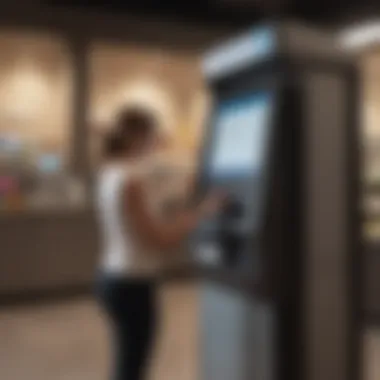Where to Cash a Personal Check: Your Comprehensive Guide


Intro
Cashing a personal check can sometimes be confusing. Many people may not know the different options available to them. Each method has its own pros and cons. Understanding your choices will allow you to navigate this financial process better. This guide will take a closer look at where to cash your personal checks, discussing banks, credit unions, and alternative financial service providers.
Understanding Your Options
When faced with a personal check, knowing your options can save you time and potentially money. Here is a closer look at some popular places you might consider:
- Banks: Most traditional banks allow you to cash personal checks if you hold an account with them.
- Credit Unions: Similar to banks, credit unions often offer competitive services for their members.
- Retail Stores: Some retail outlets provide check-cashing services, but watch out for the fees.
- Check-Cashing Services: Specialized businesses can cash checks, often without a bank account. However, fees can be high.
Before deciding where to go, think about what is most important to you, such as fees and convenience.
Evaluating Safety and Cost
Different locations come with different levels of security and cost. Checking with major banks generally provides a safer option than some alternative services. However, the fees at banks can vary widely.
- Banks: Typically, cashing a check is free if you have an account. Non-account holders may face fees ranging from $5 to $15.
- Credit Unions: Often similar to banks. Members can cash checks often for free or at a low cost.
- Retailers: Fees can range from 1% to 5%, which can add up quickly.
- Specialty Services: While quick, they can charge excessive fees, sometimes up to 10% of the check’s value.
It’s essential to balance the urgency of getting cash with the costs involved.
Important Considerations
When cashing a personal check, you should keep several considerations in mind:
- Identification: Most places will require a government-issued ID.
- Type of Check: Personal checks may be treated differently than payroll or cashier's checks, impacting how easily you can cash them.
- Time: Some banks may place holds on checks, especially if you are not a regular customer.
Understanding these factors can streamline the cashing process for you.
Final Thoughts
Cashing a personal check does not have to be daunting. Knowing your options can help. Always evaluate your choices based on safety, costs, and your particular needs. Each option has its specific requirements and related fees. Ultimately, the best choice will depend on your financial situation and context.
Prelims to Cashing Personal Checks
Cashing personal checks is an important financial process that many individuals encounter throughout their lives. Understanding the nuances of this process is essential, not just for convenience, but also for ensuring security and efficiency. The need to cash a personal check can arise from various circumstances, such as receiving payment for services, gifts, or other transactions.
This section highlights the significance of recognizing the different options available for cashing personal checks. Factors like fees, location accessibility, and processing time can significantly affect one's experience. Additionally, awareness of things like identification requirements and verification procedures plays a critical role in ensuring a smooth transaction.
Ultimately, the knowledge gained from this section can empower individuals to make informed choices when navigating the world of personal checks, leading to better financial management and reduced stress.
Understanding Personal Checks
Personal checks are paper forms that individuals use to pay for goods and services. A check contains important details such as the payer's account information, the amount, the date, and the payee's name. It serves as an instruction to the bank to transfer money from the payer's account to the payee’s account upon cashing or depositing the check.
In recent years, digital payments have gained popularity, but personal checks remain relevant for many people. They provide a way to make payments without the need for cash or electronic transfers, thus offering flexibility. However, personal checks also have certain risks, such as bounced checks, which occurs when there are insufficient funds in the payer’s account.
Why Cash a Personal Check?
There are multiple valid reasons for cashing a personal check rather than depositing it into a bank account. The decision to cash often revolves around immediate access to funds. Many people prefer to have cash on hand for various expenses or emergencies.
Cashing a personal check can be particularly advantageous when:
- You need quick cash instead of waiting for a bank deposit to clear.
- You want to avoid potential bank holds on deposited checks, which can delay access to funds.
- You do not have a bank account or prefer not to use one for certain transactions.
Understanding these motivations can help individuals decide when and where to cash personal checks, ultimately contributing to effective money management.
Traditional Banking Options


When considering where to cash a personal check, traditional banking options often emerge as the most reliable methods. They provide a sense of security and familiarity, factors that are vital when dealing with financial transactions. Using a bank or credit union ensures that funds are handled by regulated institutions, decreasing the risk of fraud. Additionally, patrons typically have a relationship with these institutions, which can simplify the verification process. Ultimately, traditional banking not only offers safety but also potential advantages like lower fees, especially for account holders.
Cashing at Your Bank
Cashing a personal check at your own bank often presents the most straightforward approach. Banks, such as Chase and Wells Fargo, are accustomed to processing checks for their customers. Generally, if you have an account, you can cash the check without incurring a fee, and funds become available immediately. This efficiency saves time and offers peace of mind.
However, there are some important considerations to keep in mind. Firstly, check cashing policies can vary even among different branches of the same bank. It’s beneficial to verify specific guidelines at your local branch. Secondly, banks typically require customers to present valid identification, such as a driver’s license or passport. Failure to do so may result in an inability to cash the check.
Lastly, some banks may impose limits on the amount of money that can be cashed, especially for non-account holders. It’s always wise to inquire beforehand if a large sum is involved.
Using a Credit Union
Credit unions provide another solid option for cashing personal checks. These member-owned financial institutions often offer advantages similar to those of traditional banks but typically have more favorable fees. For example, institutions like Navy Federal Credit Union or Alliant Credit Union often allow their members to cash checks with little to no charge.
The process is usually similar to that of banks, where valid identification is required. Additionally, credit unions might have more flexible policies towards cashing checks for non-members, but this is not universally applicable. Members may also have access to distinct services that streamline the cashing process.
It is also noteworthy to mention that customer service at credit unions tends to be more personalized. This can enhance the experience, particularly if any issues arise during the cashing process. Furthermore, many credit unions are committed to financial education, which may provide useful resources for members looking to manage their finances better.
Choosing the right option for cashing a personal check can directly influence your financial wellbeing. Traditional banking options remain pivotal in this regard.
Alternative Financial Services
Alternative financial services are crucial for individuals looking to cash personal checks without utilizing traditional banking methods. These services are particularly significant for those who may not have access to a bank account or prefer quicker options to obtain their funds. In this context, alternatives like check-cashing stores and supermarkets serve as practical solutions, but they come with specific considerations.
Check-Cashing Stores
Check-cashing stores specialize in cashing checks for a fee. They are typically found in urban areas and provide a quick and convenient service, making them a popular choice for many. These establishments attract patrons because they often do not require an account, nor do they necessitate lengthy waiting times. The process is straightforward: customers present their checks, pay the applicable fee, and receive cash almost instantly.
However, the fees associated with check-cashing can be a downside. Unlike banks that might free some services for account holders, fees at check-cashing stores can range significantly, often up to 10% of the check amount. This can lead to a hefty loss, especially on larger checks. Some stores may also impose limits on the types or amounts of checks they will cash, adding another layer of complexity for the user.
Supermarkets and Retailers
Many supermarkets and retailers offer check-cashing services as well. This option can be convenient for those already shopping at these locations. The process is often similar to that of check-cashing stores. Customers provide their checks and identification, and within moments, they receive cash. This dual-purpose service can save time and effort.
Limitations and Costs
One important aspect of supermarkets and retailers is the limitations and costs associated with the service. Many supermarkets may impose a limit on the amount of the check they will cash. For instance, some may only cash checks up to $1000, which can be a disadvantage for those with larger checks. Additionally, fees are usually in place. These can vary depending on the supermarket's policy and can range from a flat rate to a percentage of the check. This variability can lead to confusion, making it essential for users to inquire about the exact fees before cashing their checks.
Best Practices
To maximize the benefits of cashing checks at supermarkets and retailers, certain best practices should be observed. First, it is advisable to verify whether the store cashes checks before going there. Many retailers display this information at their customer service desks or on their websites. Second, ensuring that you have the necessary identification can streamline the process and prevent unnecessary delays.
Ultimately, checking the fees and limits beforehand can save time and money. By being prepared and informed, users can confidently navigate the landscape of cashing personal checks in alternative financial services.
Always consider your options carefully, as understanding fees can lead to significant savings over time.
Mobile Apps for Check Cashing
Mobile apps for check cashing have gaining popularity due to their convenience and accessibility. In an era where smartphones dominate our lives, these applications provide a seamless way to cash personal checks without the need to visit a physical location. This section explores the significance of mobile check cashing apps, their functionality, and security considerations to ensure a safe experience.
Overview of Mobile Check Cashing Apps
Mobile check cashing apps allow users to deposit checks using their smartphones. The process generally involves capturing an image of the front and back of the check, entering the required details, and submitting it for processing. Notable applications include PayPal, Ingo Money, and Cash App. Each app has specific features aimed at making cashing checks more efficient.
Benefits of Mobile Check Cashing Apps
- Convenience: Cash checks from anywhere, at any time.
- Speed: Access to funds is often quicker than traditional methods.
- Accessibility: No need for a bank visit, making it ideal for those with mobility issues.


These apps typically walk the user through the steps of capturing the check image and then provide feedback on whether the check has been successfully submitted. Some apps even offer instant cash for a fee, providing immediate access to funds which can be beneficial in emergencies.
Security Considerations
When using mobile apps for check cashing, security becomes a critical concern. Here are some key points to consider:
- Data Protection: Ensure that the app uses encryption to protect personal and financial data.
- Two-Factor Authentication: Opt for apps that incorporate two-factor authentication for an extra layer of security.
- Reputable Sources: Download apps from trusted platforms like Google Play Store or Apple App Store, and thoroughly research the app’s reputation.
Always read the privacy policy to understand how your data will be used and shared.
Important Considerations When Cashing Checks
Cashing personal checks involves several important considerations that can greatly affect the experience and outcome. Understanding factors such as fees, identification requirements, and verification processes is essential for making informed and safe choices. These elements not only determine if and how you can access your funds, but also influence the overall efficiency of the transaction. Exploring these considerations allows individuals to navigate the often complex landscape of check cashing with greater ease and confidence.
Fees and Charges
When cashing a personal check, one must be cognizant of the fees and charges associated with the transaction. Different institutions and service providers have varying policies regarding fees, which can significantly affect the amount of money you realize from a check.
Banks typically charge lower fees, especially for customers with accounts. For example, some banks may allow for fee-free cashing or charge a nominal fee based on the check's amount.
Conversely, check-cashing outlets often impose higher fees. These fees can range from a percentage of the check amount to a flat fee, usually depending on the total value. For someone cashing a large check, the costs can be substantial. Therefore, it is advisable to ask upfront about any applicable fees before undergoing the transaction. Be sure to evaluate whether the cost of cashing the check is justified when compared to other accessible options.
Identification Requirements
Identification is a critical element when cashing a personal check. Financial institutions and service providers require a form of ID to protect against fraud and ensure that the person cashing the check is the rightful payee. Most commonly accepted forms of identification include government-issued documents like a driver’s license or passport.
Some providers might have specific requirements that could vary based on the check type or amount. For instance, banks may require two forms of ID for higher-value checks. Familiarizing yourself with these identification requirements is crucial. Not having the correct documentation can lead to delays or denial of the cashing process, which can be stressing and annoying.
Check Verification Processes
The verification process for checks serves as another vital aspect of cashing personal checks. This is to ensure that checks are valid and funds are available. Providers utilize different methods to verify checks, which can include contacting the issuing bank or using automated systems.
It is not unusual for the check cashing process to take longer if the institution must verify the check thoroughly, especially for new or unfamiliar checks. Expect that larger or unusual checks may undergo more rigorous scrutiny, which could lead to a wait.
Additionally, being aware of the bank's policies can be beneficial. Some institutions may offer instant verification for certain checks if they have experience with the issuer. Understanding how verification processes work can prepare you for what to expect, reducing anxiety during the check-cashing experience.
In summary,
Understanding fees, identification requirements, and verification processes can simplify cashing personal checks and help maximize your experience.
Understanding Risks Associated with Cashing Checks
Understanding the risks associated with cashing checks is crucial for anyone considering this process. It helps to prevent potential losses, fraud, and delays that could impact your financial well-being. This section aims to highlight the key risks involved, focusing on fraudulent checks and the possibility of delayed payments. Having this knowledge equips you to handle cashing checks more safely and responsibly.
Fraudulent Checks
Cashing a personal check carries the risk of encountering fraudulent checks. A fraudulent check is one that is either fake or written with insufficient funds in the payer's account. When cashing such checks, individuals can face significant financial consequences.
Importance of Awareness
- Be vigilant when receiving checks from unknown parties. Verify the sender’s identity and account status.
- Banks typically conduct a verification process, but it may not always catch fraud immediately.
- If a check turns out to be fake, your account may be debited, leaving you responsible for the amount.
Signs of a Fraudulent Check
Here are several indications to watch out for:
- Unusual or poorly printed checks that look different from official bank checks.
- The check’s amount appears unusually large compared to your trust with the sender.
- Use of personal information that may seem out of place or incorrect.


It is essential to be aware of these signs to avoid being a victim of fraud. Always verify any checks you receive before attempting to cash them.
Delayed Payments
Delayed payments can occur for various reasons when cashing personal checks. When you present a check for cashing, the financial institution may take time to verify the check and the payer’s account.
Implications of Delayed Payments
- Availability of Funds: Until the verification process is complete, the funds from the check may not be available for your use. This situation can lead to budget issues, especially if you are waiting for these funds for urgent expenses.
- Frustration: Constantly checking for the status of your funds can be time-consuming and irritating.
- Potential Fees: If you need immediate access to funds, you might be forced to use more expensive alternative methods, resulting in additional fees.
Strategies to Manage Delays
- Choose Reputable Locations: Always cash checks at trusted banks or credit unions to minimize the chances of encountering delays.
- Establish a Relationship: If possible, work with a financial institution where you already have an account. This can sometimes expedite the verification process.
Understanding these risks is a step towards secure financial transactions. Being informed helps in making educated decisions about cashing personal checks, ensuring a smoother experience.
By keeping an eye on these risks, you can navigate the check cashing process with greater confidence and minimize potential drawbacks.
Best Practices for Cashing Personal Checks
Cashing personal checks requires careful consideration to ensure the process is safe, efficient, and cost-effective. By following best practices, individuals can avoid unnecessary complications and risks associated with check cashing. These practices not only enhance the experience but also protect one's financial interests.
Choose a Reliable Location
Selecting a reliable location for cashing a personal check is crucial. The place you choose can impact the safety and speed of your transaction. Here are some points to consider:
- Trustworthy Establishments: Always go for well-known banks or credit unions. They are more reliable compared to unfamiliar check-cashing stores or retailers.
- Customer Reviews: Research online reviews of the location. Observing customer feedback can offer insight into the experiences of others, helping you to avoid potential issues.
- Location Security: Consider the safety of the area where the check is to be cashed. It’s wise to pick a location that feels secure.
By applying these simple criteria, you can significantly reduce the chances of fraud or other negative experiences.
Keep Records
Maintaining records of the check cashing process is a smart practice. Documentation can help track transactions effectively and offer protection if issues arise later. Here’s why keeping records is important:
- Proof of Transaction: Keep a copy or image of the cashed check. This serves as proof in case there are disputes about payment or if the funds are mistakenly withdrawn again.
- Financial Management: Documenting checks helps in managing budgets. It aids in tracking income and expenses, providing a clearer picture for personal finance.
- Identifying Errors: If any mistake occurs during the process, having records allows for easier identification of the problem. This can help rectify issues smoother and faster.
By staying organized and maintaining documentation, individuals can navigate the check cashing process with improved confidence.
Effective check cashing practices not only safeguard your money but also lead to more informed financial decisions.
Epilogue
Cashing personal checks is a vital topic in personal finance management. Understanding where to cash checks is crucial for individuals who rely on various financial tools. This article has provided a thorough examination of traditional banking options, alternative services, and mobile applications.
Importance of This Topic
Cashing checks is often necessary to access funds quickly. Each method discussed has its advantages and disadvantages. Hence, knowing these options allows individuals to choose what's best suited to their needs while being mindful of potential fees and security requirements.
The choice of where to cash a personal check can impact your financial health significantly.
Strategic Decision-Making
Selecting the right location can influence not only convenience but also the financial implications of each transaction. Readers are more informed about the overall process, which equips them to make better financial decisions. Especially in a world where cash flow matters, understanding these options is essential for effective financial management.
Summary of Key Points
- Types of Check Cashing Options: The article covered banks, credit unions, and alternative services like check-cashing stores and mobile apps.
- Costs and Fees: It's vital to understand associated fees, as they can vary greatly among different locations and services.
- Identification Needs: Being aware of what identification is required is essential for a smooth transaction process.
- Verification and Security: Knowing the checks' verification processes helps in preventing fraud, protecting your finances.
Understanding these key points offers a clearer overview of the landscape of check cashing, making it easier to navigate.
Final Thoughts on Cashing Personal Checks
Cashing personal checks shouldn’t be seen as just a routine transaction. It is a mechanism of financial management that can either empower or complicate one's financial standing.
Be Cautious
Develop a habit of assessing each check cashing opportunity critically. Always consider fees, security measures, and the reliability of the location.
For more insights about financial management and cashing checks, consider checking platforms and real-life discussions on financial literacy such as reddit.com, facebook.com or resources like en.wikipedia.org and britannica.com.







